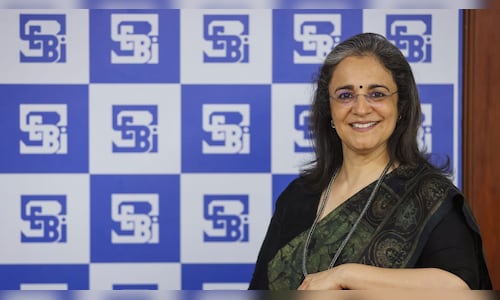[ad_1]
This has raised questions about Sebi’s impartiality in its regulatory oversight. Sebi’s chairperson, her husband, and the Adani Group have denied these allegations, dismissing them as baseless.
Calls are growing from the Opposition for a probe by a Joint Parliamentary Committee in the wake of the latest Hindenburg allegations. We find out what the Sebi rules say on conflict of interest and what experts think of the matter.
Sebi’s Code on Conflict of Interests for Members of Board states, “A member, who is directly or indirectly interested in any matter coming up for consideration at a meeting of the board, shall disclose the nature of his interest at such meeting.
A member shall not take part in any deliberation or discussion of the board with respect to such matter except to the extent of professional advice if sought by the board. And that no member shall hear or decide any matter where he has a conflict of interest.”
In the joint statement, Madhabi Puri Buch and her husband have said: “Our life and finances are an open book. All disclosures as required have already been furnished to Sebi over the years.”
In its report, Hindenburg said the Buchs had opened an account on June 5, 2015, with Mauritius-based IPE Plus Fund 1, which was allegedly involved in fund siphoning.
Replying to this in another statement, the Buchs said: “The investment in the fund referred to in the Hindenburg report was made in 2015 when they were both private citizens living in Singapore and almost 2 years before Madhabi joined Sebi, even as a whole-time member.”
They further clarified that their decision to invest in the fund was because its Chief Investment Officer Anil Ahuja is Dhaval Buch’s childhood friend and had many decades of a strong investing career.
“The fact that these were the drivers of the investment decision is borne out by the fact that when, in 2018, Mr. Ahuja, left his position as CIO of the fund, we redeemed the investment in that fund. As confirmed by Ahuja, at no point in time did the fund invest in any bond, equity, or derivative of any Adani group company.”
The Buchs further added, “SEBI has strong institutional mechanisms of disclosure and recusal norms as per the code of conduct applicable to its officers. All disclosures and recusals have been diligently followed.”
CNBC-TV18 also spoke to several experts.
Abhishek Rastogi, founder of Rastogi Chambers, questioned Hindenburg’s motives for raising the conflict of interest issue at this juncture, without responding to Sebi’s show-cause notice, suggesting that it might be an attempt to distract from the ongoing legal processes in India.
“In the conflict of interest matter, the list of dates is very important. When was Buch appointed as the chief? When was she the whole-time member? And when were these investments made or disinvestments paid? So, disclosures will have to be weighed in terms of analysing whether the conflict of interest exists or not,” Rastogi said, adding Hindenburg is trying to create panic in the market.
Sudip Bandyopadhyay, a seasoned market expert, downplayed the significance of the allegations, arguing that they hold little merit beyond questioning whether the Sebi chairperson should have recused herself from an earlier investigation.
“As a private citizen, the chairperson’s husband can participate in any commercial activity he chooses to,” he said, emphasising that the chairperson had divested her investments before assuming her role at Sebi.
Bandyopadhyay suggested that the report is more of an attempt to create market confusion and panic rather than address any substantive issue.
On the potential market impact, Bandyopadhyay predicted only a minor stock reaction. He argued that the fundamentals of Adani, or any other corporate entity, are not directly affected by these allegations. “Whatever correction happens… will be a great opportunity for long-term investors,” he said, pointing to the robust liquidity in the domestic market as a stabilising force.
HP Ranina, a senior advocate at the Supreme Court, was also dismissive of the allegations, labelling them as “suspicions, conjectures.” He urged the Sebi chairperson to consider legal action against Hindenburg if the allegations persist.
Sunil Subramaniam, an industry veteran, underscored that Hindenburg is a for-profit research firm that profits from short-selling markets based on the information it releases. Subramaniam speculated that the timing of the report’s release—on a Saturday night—was designed to create panic among retail investors and trigger a market sell-off on Monday morning. However, he remained confident that the long-term fundamentals of India’s economy and stock market would remain unaffected by these short-term manoeuvres.
Watch the accompanying video for the entire discussion.
[ad_2]
Source link










